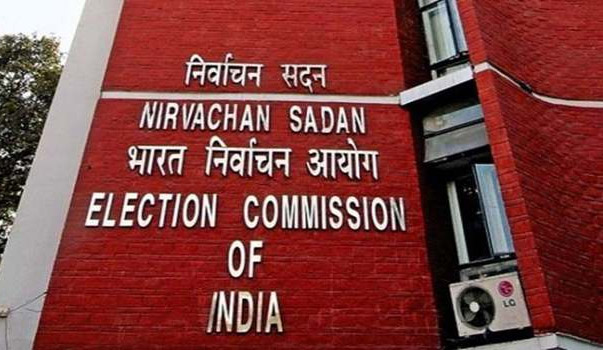Assembly elections process set in motion
*July 1 fixed as qualifying date for updation
Sanjeev Pargal
JAMMU, June 21: Setting the process in motion for maiden election to the Legislative Assembly in the Union Territory of Jammu and Kashmir, the Election Commission of India today ordered second Special Summary Revision of photo electoral rolls in the UT besides three other States including Maharashtra, Jharkhand and Haryana where elections are due later this year.
 As per the schedule released by the Election Commission, the final electoral rolls will be published on August 20 i.e. a day after the culmination of 52-day long annual pilgrimage of Shri Amarnath Ji shrine in South Kashmir Himalayas. The Supreme Court of India while delivering its verdict in favour of abrogation of Article 370 on December 11, 2023, had directed the Election Commission to hold Assembly elections in Jammu and Kashmir before September 30, 2024.
As per the schedule released by the Election Commission, the final electoral rolls will be published on August 20 i.e. a day after the culmination of 52-day long annual pilgrimage of Shri Amarnath Ji shrine in South Kashmir Himalayas. The Supreme Court of India while delivering its verdict in favour of abrogation of Article 370 on December 11, 2023, had directed the Election Commission to hold Assembly elections in Jammu and Kashmir before September 30, 2024.
The Election Commission has set July 1, 2024 as the qualifying date for roll updation. For the just-held Lok Sabha polls, the voters’ list was updated with January 1 as the qualifying date.
Qualifying date helps establish number of voters on a given date in a State/UT or in the country. Click here to watch video
The pre-revision activities will be carried out between June 25 to July 24 while Integrated draft electoral rolls will be published on July 25. Claims and objections can be filed between July 25 to August 9. Claims and objections will be disposed on August 19 and final electoral rolls will be published on August 20.
“All the pre-revision activities shall be undertaken in accordance with the Commission’s existing instructions and guidelines and Manual on Electoral Roll, 2023 and Manual on Polling Stations, 2020,” the EC order sent to the Chief Electoral Officers (CEOs) of Jammu and Kashmir, Jharkhand, Haryana and Maharashtra, said.
The term of the existing Legislative Assemblies in the three States of Haryana, Jharkhand and Maharashtra are going to end on November 3, November 26 and January 5, 2025 respectively and elections to these Assemblies are required to be conducted before the completion of their terms.
Follow the Daily Excelsior channel on WhatsApp
Besides, Assembly elections in Jammu and Kashmir are also to be conducted for constituting a new house after delimitation of constituencies, the EC noted.
No election has been held to the 90-member Legislative Assembly of Jammu and Kashmir after it became the Union Territory on August 5, 2019 when special status of erstwhile State was abrogated and Ladakh, a division of the then State, was also carved out as separate UT.
Besides 90 seats where elections are to be held including 47 in Kashmir division and 43 in Jammu division, there is a provision for nomination of five MLAs including two women, two Kashmiri migrants, one of them a woman, and one Pakistan occupied Jammu Kashmir (PoJK) refugee.
Other than this, 24 Assembly seats are reserved for PoJK which is in illegal occupation of Pakistan.
Prime Minister Narendra Modi in a function in Srinagar yesterday stated that Assembly elections would be held soon in Jammu and Kashmir and plans are underway to restore Statehood to the Union Territory in the near future.
In his first visit to the Valley after becoming the Prime Minister for the third consecutive term, Modi emphasised the importance of enabling the people of Jammu and Kashmir to elect their representatives for the Assembly.
In an indication that Assembly polls in Jammu and Kashmir are imminent, the Election Commission had on June 7 said it has decided to accept applications seeking allotment of ‘common symbols’ from registered unrecognised parties in the Union Territory with immediate effect.
An official had explained that under Para 10 B of the Election Symbols (Reservation & Allotment) Order, 1968, any registered unrecognised political party can apply for a ‘common symbol’ six months prior to the end of the term of a House.
But since no Assembly is functional in Jammu and Kashmir, the EC has issued a press statement inviting applications for symbols.
While recognised national and State parties have their ‘reserved symbols’, registered unrecognised parties have to apply for one to field candidates. When free symbols are allocated to unrecognised parties, the Returning Officer allocates the remaining unclaimed symbols to Independents “on the spot”.
Enthused by the voter participation in Jammu and Kashmir in the just-held Lok Sabha polls, Chief Election Commissioner Rajiv Kumar had recently stated that the poll panel will “very soon” initiate the process of holding Assembly polls in the Union Territory.


